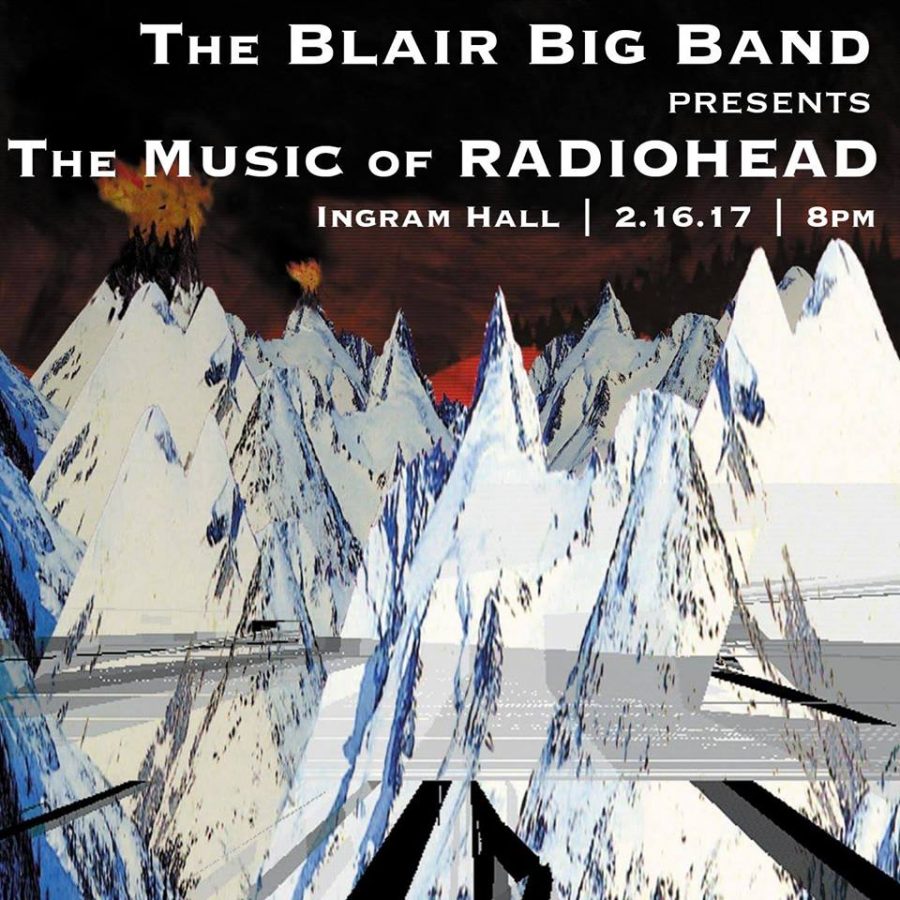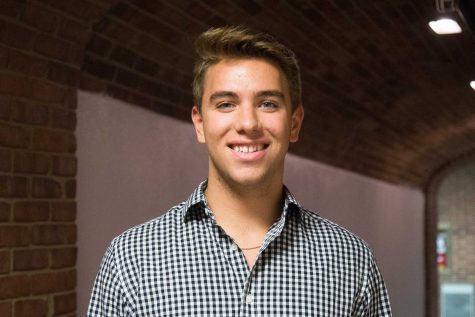Ryan Middagh, director of Blair’s Big Band Jazz Ensemble, sat down with us to discuss Thursday’s Radiohead concert, the work that went into it, and plans for the future.
VH: How did the whole Radiohead idea come about?
RM: Well some of these works were originally commissioned by the University of Lawrence in Wisconsin, so it was a collective of composers and arrangers that had already done some of these works. And always having been a fan of the music of Radiohead, I took a special interest in it, and, especially some of these arrangements, were done by people I have great respect for and they’re really well done musical arrangements for big band. In addition to these arrangements, my colleague Tucker Biddlecombe, who is the director of choirs here at Vanderbilt, did a choral arrangement of “True Love Waits,” which is one of the more recent songs. Then I did an arrangement of “Creep” for big band and the chorus. I actually just came back up here from listening to the chorus read through of “Creep,” and it’s going to be really cool.
VH: So some of the songs were from University of Lawrence and some of them were from Vanderbilt people like yourself. How did you select from the University of Lawrence ones? Did you take all of them or only some?
RM: I didn’t take all of them. They actually did a record of all these arrangements. Not everyone’s from University of Lawrence. That university commissioned a bunch of composers and arrangers, one of which was my main mentor named Robert Washut who I studied with when I was a student at Northern Iowa, so of course I love his arrangements. I just picked what I thought was going to be the most fun is really what it comes down to, and then wrote things specifically for the band as well. These arrangements, the arrangements that Tucker Biddlecombe and myself did are just especially for us, nobody else has those.
VH: How did you pick from Radiohead’s catalog? Do you have favorites that you went to?
RM: I really did it based off the arrangements. We’re doing “Kid A,” we’re doing “Paranoid Android,” we’re doing “Bodysnatchers,” “2+2=5.” There were some that I would have liked to have programmed but maybe the arrangement didn’t work as well in the big band setting. I picked some of the big hits, “High and Dry” is in there. Some of these arrangements are really unique. Some of them really hold true to the original recording, some really depart into other directions. For example, the arrangement of “High and Dry” is in ⅞ (time) versus 4/4 which is the original, and it has some very interesting moments to it.
VH: Have you guys ever done anything like this before?
RM: No, we’ve never done anything like this before. I’ve been trying to communicate that to the band because I’m at this point where I’ve been playing in big bands professionally and academically for twenty years at least, now, and there’s never been a concert like this, and especially combining a chorus with a big band is really unique. I haven’t come across anyone else doing that.
VH: What made you want to combine the two? Was that just because you’re close with their director and you guys both had an appreciation for this?
RM: Yeah, there was a joint appreciation for the music, and Tucker likes Radiohead. I think this really all started my spring semester my first year here, so that would have been spring of 2015. I have an arrangement of “High and Dry” for big band that’s a lot easier and a lot more straightforward than the one we’re doing Thursday night, and Tucker heard it and was like “I love Radiohead.” We initially talked about having a joint concert of the choirs and the big band, but never so much as putting them together. And then it just kind of formed.
VH: Do you think you would do anything like this again now that you’ve set this precedent? Do you feel like you’ve opened doors to explore this more?
RM: Yeah, I think it’s definitely something I want to explore more. And I think it comes down to how we do things, because I went to some really great schools for jazz and big band and just because we have a habit of making things stale and making it the same all the time, because like “we’re going to do this because this is the way we’ve always done it,” and I don’t want to buy into that anymore. I really want to challenge how we do things anywhere from the repertoire that we program to how we perform it to how we dress when we perform it, kind of some of the production aspects of things. We have a really great technical team here at the Blair School, and they’re going to have lots of cool lighting. I sat right here with our tech director Joe DeBusk for almost an hour today just ironing out all the technical aspects of it, because I want to present it in an interesting way. Too often we get into the habit of music being performed as “we’re just going to sit down, play this music for you, you are going to listen to this music, you will enjoy this music.” We’re trying to make it more interactive, and it’s not going to be perfect, but we’re going to try.
VH: What was the most challenging about this whole production?
RM: Honestly, not a whole lot. Picking the music, picking out the pieces honestly. The band came in and they’re just ready to play. We went to New Orleans at the beginning of January, and I think everyone was really inspired by that. When we got back to school at the beginning of the semester, people were ready to play.
VH: Has everyone reacted positively to this idea?
RM: I believe everyone in the band has. There’s been other students within Blair that maybe are lukewarm to the idea. Not everyone’s a fan of Radiohead, that’s their own personal taste and that’s fine. But the band’s really eating it up. Our rehearsal today went extremely well. They’re playing the best that they’ve ever played, so I get the sense that they’re really enjoying it. And I’m also passing a lot of freedom onto them as well. The more invested they become, the more freedom I can give them. There’s going to be moments in the concert on Thursday between pieces where some of the students are freely improvising into the next piece. The whole goal is to have this continuous landscape of music and to make it creative. We have some really strong students, we have some great seniors in the band right now that really help lead the band well and are playing at a high level, so there’s going to be students improvising in between these transitions. It just breathes a little life into the music because it’s all in that moment.
The concert will be at 8 p.m. on February 16, 2017 in Ingram Hall at the Blair School of Music.



